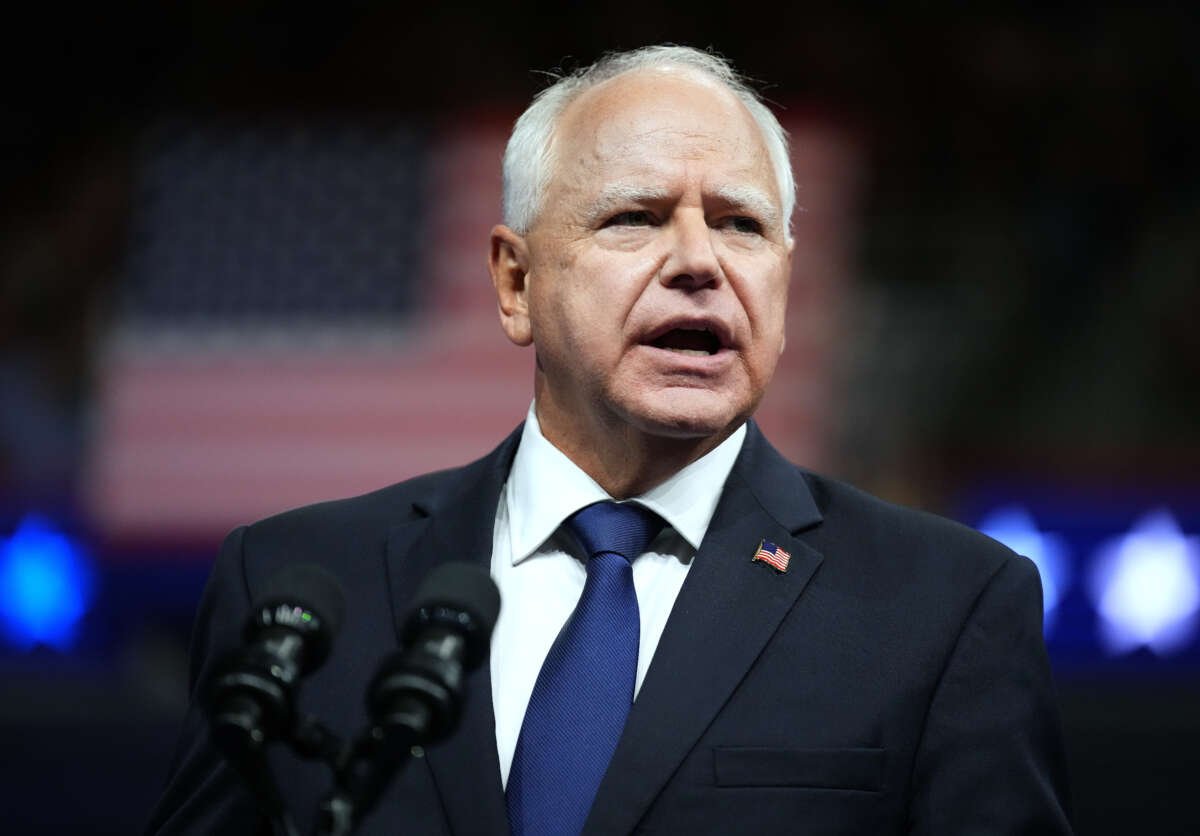Honest, paywall-free news is rare. Please support our boldly independent journalism with a donation of any size.
The selection Tuesday of Tim Walz, governor of Minnesota, as Kamala Harris’ vice presidential running mate spotlights a clear contrast with J.D. Vance, his counterpart on Donald Trump’s ticket, on the issue of voting.
As governor, Walz has staked out a lengthy policy record on voting and election issues, including an expansion of voting rights. Vance has had fewer opportunities to affect voting policy as a senator, but his statements on the subject over the last four years, including false claims about voter fraud, offer insight into his views.
Here’s a look at the positions the two running mates have taken:
Tim Walz: Signed Legislation to Expand Voting Options
After 12 years representing Minnesota in the U.S. House, Walz was elected governor in 2018 and reelected in 2022, with winning margins of 11 and 8 points, respectively. Since that time, he has signed multiple voting-related bills, and Minnesota has expanded voting access significantly.
Most of the bills were passed last year under a fully Democratic-led legislature, and took effect this year. Most notably, Walz signed the sweeping Democracy for the People Act in May 2023. It overhauled voting processes in a state that was already the highest in the nation for voter turnout. The legislation introduced automatic voter registration, allowed 16- and 17-year-olds to register in advance to vote, expanded vote by mail, and increased the number of languages in which voting materials were printed.
The next month, he signed legislation that restored voting rights to more than 50,000 Minnesotans on parole with a felony conviction. It amounted to the largest change in voter eligibility in the state in more than 50 years.
This year, Walz signed an omnibus election bill supporters referred to as the Minnesota Voting Rights Act, as it was proposed in response to the U.S. Supreme Court’s rollback of protections under the federal 1965 Voting Rights Act. It allows voters to challenge unfair electoral systems in court and ends prison gerrymandering, so that people who are in state or federal prison are counted for representation based on where they’re from, not where they are incarcerated.
“Today, we’re ensuring a strong democracy by prioritizing accessibility and voter protections,” Walz said in a release about the signing. “With this bill we are breaking barriers that stand in the way of voting, protecting fair democratic processes, and paving the way for Minnesota to continue to lead the nation in voter turnout.”
In July, he signed a bill making Minnesota the first state in the nation to pass sweeping regulations on election-related AI deep fakes.
J.D. Vance: Voter Fraud Claims, Voting Power for Parents
Vance was elected to the U.S. Senate in November 2022. By then, he’d already come out swinging against progressive voting policies and making false claims about voter fraud. In response to a Democratic proposal to lower the voting age to 16, he proposed giving additional voting power to parents.
“If you don’t have as much of an investment in the future of this country, maybe you shouldn’t get nearly the same voice,” Vance said in July 2021, shortly after announcing his Senate candidacy, promoting an idea that parents should be able to cast ballots for their underage children.
“Let’s give votes to all the children in this country, and let’s give control over votes to the parents in this country,” he said.
That October, Vance told a reporter for The Vindicator — a local newspaper serving Ohio’s Youngstown area — that illegal voting happened on “a large-scale basis” in the 2020 election. In the same interview, Vance repeated proven misinformation about private election spending, saying Facebook founder Mark Zuckerberg spent $420 million “buying up local boards of elections in battleground states of mostly Democratic areas” to “tilt” the vote in Joe Biden’s favor.
In 2022, Vance’s campaign ran a television ad that falsely claimed undocumented immigrants coming into the country are voting in elections. “Joe Biden’s open border is killing Ohioans with more illegal drugs and more Democrat voters pouring into this country,” Vance said in the ad.
Vance has been consistent in his support for those who stormed the Capitol on Jan. 6, 2021, and said in an interview with ABC News’ George Stephanopoulos in February that — had he been vice president overseeing Congress’s certification of the 2020 election — he would not have accepted the electoral votes some states submitted for Biden.
Instead, he said, he would have allowed multiple slates of electors to be presented and “the U.S. Congress should have fought over it from there. That is the legitimate way to deal with an election that a lot of folks, including me, think had a lot of problems in 2020.”
In a June interview, he told New York Times columnist Ross Douthat that Congress should have held an open debate breaking down Trump’s claims of voter fraud. “Do I think Joe Biden would still be president right now? Yeah, probably,” he said. “But at least we would have had a debate.”
Votebeat is a nonprofit news organization covering local election integrity and voting access. Sign up for their newsletters here.
Press freedom is under attack
As Trump cracks down on political speech, independent media is increasingly necessary.
Truthout produces reporting you won’t see in the mainstream: journalism from the frontlines of global conflict, interviews with grassroots movement leaders, high-quality legal analysis and more.
Our work is possible thanks to reader support. Help Truthout catalyze change and social justice — make a tax-deductible monthly or one-time donation today.
